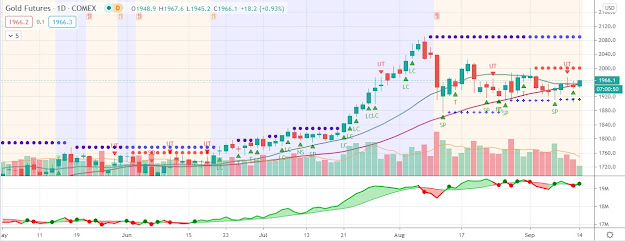Gold’s outlook for the foreseeable future remains particularly bright.
The gold price advanced modestly on Tuesday for a second consecutive
session as investors awaited the outcome of today’s U.S. presidential
election. The spot price of gold
rose $9.44, or 0.6%, to a high of $1,694.12 per ounce this morning
while the U.S. dollar dipped 0.2% against a composite of foreign
currencies. The SPDR Gold Trust (GLD), the world’s most liquid gold
price proxy, moved up by $0.85 to $164.08 per share.
While many political issues may be heavily influenced by whether Barack Obama or Mitt Romney wins the election, the outlook for U.S. monetary policy is not one of them, according to Peter Boockvar – equity strategist at Miller Tabak and a contributor to Minyanville.com. In a note this morning, Boockvar argued that with an Obama victory, monetary policy will stay the same, while a win for Romney will also not make a difference.
“While Romney will likely replace Bernanke with a hawkish Chairman, Ben is still in place until January 2014,” Boockvar wrote. “Secondly, the economic dependence on the drip of cheap money is so embedded that any back off from current Fed QE (quantitative easing) on a Romney win will quickly lead to an economic downturn, something Mitt won’t want to face in his first year.”
The Miller Tabak strategist went on to say that “Ben (Bernanke) knows that his MBS purchase program will be completely diluted with rates rising if he doesn’t embark on QE4, buying Treasuries, when OT (Operation Twist) expires on Dec 31. Therefore, at least for the next year, I believe monetary policy does not change.”
Analysts at UBS echoed Boockvar’s sentiments, noting that “Even if Romney wins, monetary policy in the short-to-medium-term is unlikely to change…[quantitative easing] will remain in place at least for the next fourteen months should subdued growth expectations play out, and gold participants need to bear this in mind.”
As GoldAlert has discussed on several occasions, gold prices have historically risen by an average of 20% per year during periods of negative real interest rates. With the deflationary risks of the ongoing European sovereign debt crisis, the U.S. fiscal cliff, and considerably slower economic growth in China and other emerging markets, the Federal Reserve is highly unlikely to alter their ultra-accommodative stance anytime soon. Therefore, gold’s outlook for the foreseeable future remains particularly bright.
While many political issues may be heavily influenced by whether Barack Obama or Mitt Romney wins the election, the outlook for U.S. monetary policy is not one of them, according to Peter Boockvar – equity strategist at Miller Tabak and a contributor to Minyanville.com. In a note this morning, Boockvar argued that with an Obama victory, monetary policy will stay the same, while a win for Romney will also not make a difference.
“While Romney will likely replace Bernanke with a hawkish Chairman, Ben is still in place until January 2014,” Boockvar wrote. “Secondly, the economic dependence on the drip of cheap money is so embedded that any back off from current Fed QE (quantitative easing) on a Romney win will quickly lead to an economic downturn, something Mitt won’t want to face in his first year.”
The Miller Tabak strategist went on to say that “Ben (Bernanke) knows that his MBS purchase program will be completely diluted with rates rising if he doesn’t embark on QE4, buying Treasuries, when OT (Operation Twist) expires on Dec 31. Therefore, at least for the next year, I believe monetary policy does not change.”
Analysts at UBS echoed Boockvar’s sentiments, noting that “Even if Romney wins, monetary policy in the short-to-medium-term is unlikely to change…[quantitative easing] will remain in place at least for the next fourteen months should subdued growth expectations play out, and gold participants need to bear this in mind.”
As GoldAlert has discussed on several occasions, gold prices have historically risen by an average of 20% per year during periods of negative real interest rates. With the deflationary risks of the ongoing European sovereign debt crisis, the U.S. fiscal cliff, and considerably slower economic growth in China and other emerging markets, the Federal Reserve is highly unlikely to alter their ultra-accommodative stance anytime soon. Therefore, gold’s outlook for the foreseeable future remains particularly bright.




Comments
Post a Comment